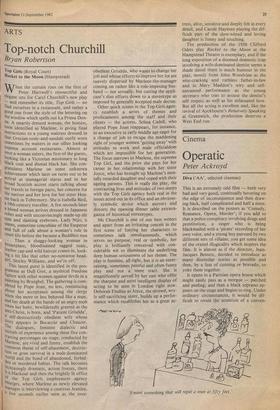ARTS
Top-notch Churchill
Bryan Robertson
Rocket to the Moon (Hampstead)
When the curtain rises on the first of Peter Hartwell's resourceful and elegant sets for Caryl Churchill's new play and remember its title, Top Girls — we find ourselves in a restaurant, and rather a good one from the style of the lettering on the window which spells out La Prima Don- na. A smartly dressed woman, the hostess, soon identified as Marlene, is giving final Instructions to a young waitress dressed in that Grecian-tunic-and-sandals outfit worn sometimes by waiters in our sillier looking expense account restaurants. Almost at once a woman enters, the first of the guests, looking like a Victorian missionary in long black coat and dismal black hat. She con- gratulates Marlene on some unknown achievement which later on turns out to be arrival at managerial status and in her broad Scottish accent starts talking about her travels in foreign parts, her concern for the natives and her love for her sister Hen- ole back in Tobermory. She is Isabella Bird, a 19th-century traveller. A few seconds later a blond woman arrives dressed in Japanese robes and with unconvincingly made-up slit eyes and slanting eyebrows. Lady Nijo, it seems, sometime concubine of the Emperor and full of talk about a woman's role in Court life before she became a Buddhist nun ; • Then a shaggy-looking woman in breastplate, bloodstained ragged tunic, leather cap and wild haircut comes in, look- 1 trig a bit like that other no-nonsense head- girl, Shirley Williams, and we're off. This latest guest is identified in the pro- gramme as Dull Gret, a mythical freedom lighter with other women against devils in a Painting by Brueghel. The gathering is com- pleted by Pope Joan, no less, reminiscing about her acceptance among the clergy when she more or less behaved like a man, and her death at the hands of an angry mob when her baby, bewilderedly greeted as the anti-Christ, is born, and 'Patient Griselda', a self-destructively obedient wife whose story appears in Bocaccio and Chaucer. The dialogues, feminist dialectic and recitals of experience among these five con- trasting personages on stage, conducted by Marlene, are vivid and funny, establish the common theme of self-abasement, destruc- tion or grim survival in a male-dominated world and the bond of abandoned, forbid- en or murdered babies. The talk becomes 1riereasingly dramatic, action freezes, there Is a blackout and then the brightly lit office Of the Top Girls employment agency emerges, where Marlene as newly elevated manager is interviewing a cautious Jeanine, a few seconds earlier seen as the over-
obedient Griselda, who wants to change her job and whose efforts to improve her lot are suavely dispersed by Marlene-the-manager coming on rather like a role-imposing hus- band — not sexually, but cutting the appli- cant's dim efforts down to a stereotype as imposed by generally accepted male decree.
Other quick scenes in the Top Girls agen- cy establish a series of themes and predicaments among the staff and their clients — the actress, Selina Cadell, who played Pope Joan reappears, for instance, as an executive in early middle age eager for a change of job to escape the maddening sight of younger women 'getting away' with attitudes to work and male officialdom which are impossible for her generation. The focus narrows to Marlene, the supreme Top Girl, and the price she pays for her career in her relationship with her sister Joyce, who has brought up Marlene's men- tally retarded daughter and coped with their ageing parents. This is really the play, the contrasting lives and attitudes of two sisters with the Top Girls agency both real in the issues acted out in its office and an obvious- ly symbolic device which mirrors and distorts the opening dinner table extrava- ganza of historical stereotypes.
Ms Churchill is one of our best writers and apart from an irritating conceit in the first scene of forcing her characters to sometimes talk simultaneously, which serves no purpose, real or symbolic, her play is brilliantly conceived with con- siderable wit to illuminate the underlying deep human seriousness of her theme. The play is feminist, all right, but it is an enter- taining, sometimes painful and often funny play and not a mere tract. She is magnificently served by her cast who offer the sharpest and most intelligent display of acting to be seen in London right now. Deborah Findlay as Joyce, the shrewd, wry- ly self-sacrificing sister, builds up a perfor- mance which establishes her as a great ac-
tress, alive, sensitive and deeply felt in every detail, and Carole Hayman playing the dif- ficult part of the slow-witted and loving daughter is funny and touching.
The production of the 1938 Clifford Odets play Rocket to the Moon at the Hampstead Theatre is exemplary, and if the long exposition of a doomed domestic trap involving a wife-dominated dentist seems a shade dated there is much humour in the play, mostly from John Woodvine as the wise-cracking and ruthless father-in-law and in Mary Maddox's wiry and self- entranced performance as the young secretary who tries to arouse the dentist's self respect as well as his infatuated love. But all the acting is excellent and, like the revival of Ayck bourn's Relatively Speaking at Greenwich, the production deserves a West End run.


































 Previous page
Previous page